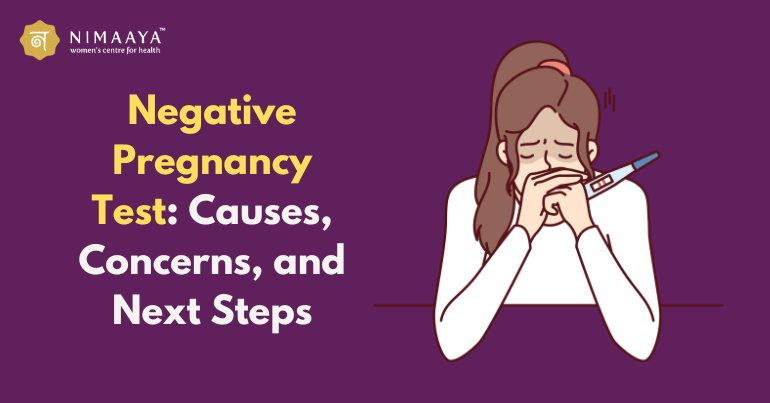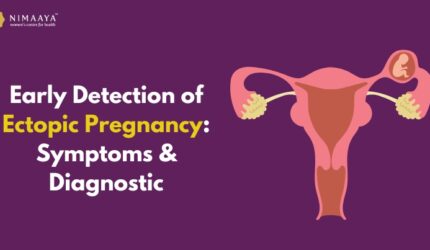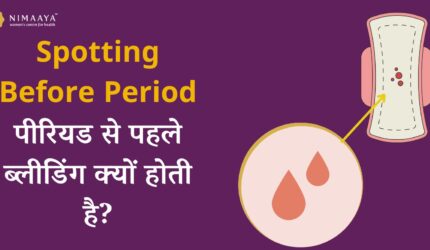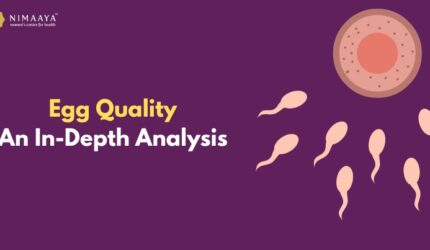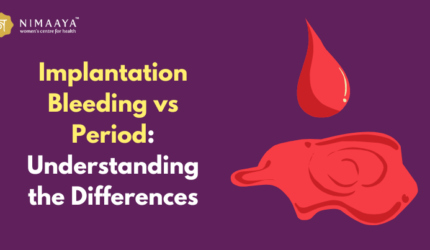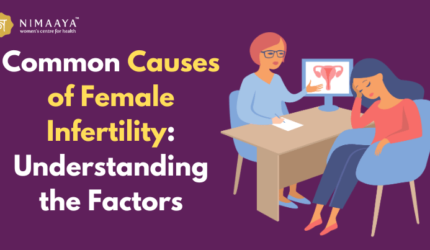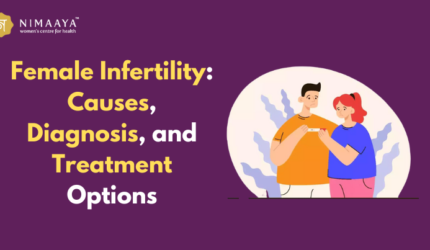Pregnancy is an important milestone for many people in a relationship. Nowadays, owing to home pregnancy kits, one does not have to wait long before taking a test upon the suspicion of being pregnant. However, it can also be a perplexing and confusing experience for some, especially with the presence of distinct physiological signs associated with pregnancy such as amenorrhea, when one receives a negative test result. It is critical to know the causes which lead to a negative pregnancy test and such cases, why even after a woman has missed her period, she can still be said not to be pregnant. This helps in reducing stress as well as aid in addressing future reproductive health concerns.
How Does a Pregnancy Test Work?
To delve into the aspects leading to instances of a woman testing negative for pregnancy, it is crucial to examine how pregnancy tests work. Most home pregnancy test kits (HPTs) test for the presence of hCG in the urine of a woman. This is a hormone that comes into existence in the urine of an expectant woman due to the development of the placenta soon after the fertilized ovum implants into the uterus, which is about six to ten days after the union of the sperm and the ovum. This hormone develops in the body as the pregnancy extends especially when hCG leaves the body reaching a normal range by the tenth week of the authorities.
Pregnancy tests are most accurate when taken after the woman misses her period since hCG takes a while to build up in the system. Whereas some of the early pregnancy tests are aimed at identifying the hCG content even before the periods get missed, they still tend to give false results when the hormone is less than the expected level. When the hCG levels are too low, the test may not detect the hormone and hence show a negative result, even though the woman is pregnant.
Reasons for Late Period
For many women, a missed or late period is usually the first alert to the possibility of conception. However, there are several other reasons not related to pregnancy that can make one get a missed period. Here are a few common causes of a missed or late period:
Stress:
This is psychological and physical pressure and it can affect the cycle to a great extent. Stress influences the hypothalamus which is responsible for the hormones that control menstruation among other things. Therefore, when a person is experiencing high levels of stress, the period may be postponed or even missed completely.
Hormonal imbalances:
Managing conditions such as polycystic ovary syndrome (PCOS) and thyroid diseases can affect the hormone levels in the body and thus the periods become irregular or missed entirely. This presents a situation where polycystic ovary syndrome encourages the absence of ovulation increasing the number of periods within a year. The functionality of the thyroid gland, irrespective of the growths being benign in nature, hyperthyroidism or hypothyroidism also alters the counts and patterns of menstruation.
Weight Changes:
Sudden weight loss, severe obesity, or being skinny may affect the normal production of hormones in the body which can result in the absence of menses. Extremes of weight in the body’s fat deposits will withhold ovulation where periods will be regular and in turn cause missed ones.
Perimenopause:
Those who are advancing in age and are about to enter the menopause stage may experience some changes in levels of hormones resulting in misplaced periods or no periods at all. This stage which is referred to as perimenopause might take a few years before the women stop menstruating completely.
Medications:
There are some drugs which are, for instance, oral contraceptive pills, antidepressants, or chemotherapy drugs and these may cause changes in the cycle making it possible to miss out on periods or delays in them.
Negative Pregnancy Test But No Period
Experiencing a missed menstrual period coupled with negative pregnancy test results is one of the most baffling and mind-boggling circumstances any person can find themselves in. Consequently, it can be irritating as many people believe that not getting their period equals being pregnant. This, however, is not the case for several reasons:
Taking the Test Too Early:
The most probable cause that will lead to a negative pregnancy test even after a missed period occurs when the test is carried out too early . For the avoidance of doubt, the hCG hormone will require time to be synthesized and released into the system. If announced their period a few days back and somebody does a test, there may not be an adequate amount of hCG in the urine to indicate pregnancy.
Delayed Ovulation:
An ovulation cycle of 28 days is characterized by ovulation occurring on the 14th day. On the other hand, one can ovulate later than the halfway point of the cycle because of variables such as stress, disease, or hormone levels. Late ovulation means that the couple will have intercourse later in the cycle leading to pregnancy, therefore increasing the hCG levels after a longer time than the expected time for those levels, which makes a test negative during that time.
Test Error:
Although home pregnancy tests tend to be accurate, there are times when it is possible to get a wrong test. This can result from using dysregulated moistened test strips, not keeping them in a proper environment or a mistakable use. In these instances, it may be advisable to wait a few days and retest or seek medical advice for a blood test instead.
Ectopic Pregnancy:
Though rare, ectopic pregnancy can also be influenced wherein the fetal growth occurs outside of the uterus, in the fallopian tubes, yet results in no positive pregnancy test. These types of ectopic pregnancies, however, have subnormal hCG levels leading to negative pregnancy tests. An ectopic pregnancy is an urgent situation that needs medical attention.
Stuff You Should Know About A Chemical Pregnancy:
A chemical pregnancy refers to a situation in which a fertilized egg attaches itself to the walls of the uterus but does not go further into development leading to an early loss of pregnancy. In this scenario, hCG levels can increase enough to cause a positive test and a missed period and drop back, leading to a negative test thereafter.
Anovulation:
Some cycles of menstruation are anovulatory which means that there is no ovulation that takes place. This can result in a delayed or missed period, and with no ovulation taking place, conception is not a possibility. There are several reasons which can explain anovulation such as stress, hormonal imbalance or health conditions such as PCOS.
2 Months Missed Period Negative Pregnancy Test
To have two menstrual cycles missed without the presence of a positive pregnancy test is distressing. At this juncture, various aspects should be contemplated:
Consulting A Doctor:
If two periods are missed and the pregnancy test is negative, then it is high time for a healthcare provider. This is to ensure that the menstrual cycle is not affected by some ailments such as PCOS, a thyroid disorder, or an imbalance of hormones.
Blood Tests For Pregnancy:
Occasionally, a blood pregnancy test is the only test that can confirm a positive pregnancy. The reason is that blood tests can detect HCG levels which are lower than what is obtainable with urine tests and are clear-cut, particularly in cases where there might be doubts about the cycle of ovulation or even conception.
Pelvic Ultrasound:
Pregnancy having been ruled out and periods still absent, a pelvic scan will be done to identify any reproductive organ defects such as ovarian cysts or fibroids that may be responsible for the absence of menstruation.
Lifestyle Adjustments:
Irramenorrhoea may sometimes be attributed to psychosocial factors such as stress or nutrition, particularly physical training. If that is the case, it is advisable to prolong the stress relief programme, adhere to a healthy diet and engage in only moderate physical training, to attain menstrual cycle restoration.
Fertility Issues:
There is a possibility of fertility issues that should be dealt with when an individual who is pursuing pregnancy experiences a delay of two menstrual cycles with a negative pregnancy test. Such examination and management can be provided by a subspecialist in fertility.
Nimaaya IVF Center: Expert Care for Reproductive Health
When a woman receives a negative pregnancy test and has further concerns regarding absent menses or infertility, then the situation presents a case where she would have to seek professional help. This is where the services of reproductive health providers and centers like the Nimaaya IVF Center become essential. Nimaaya IVF Center is configured as a modern and complete fertility clinic that provides a full spectrum of services ranging from diagnostic works to advanced procedures which include in vitro fertilization. The knowledgeable staff appreciates the effect fertility issues have on individuals or couples both physically and emotionally.
At Nimaaya IVF Center, a patient with a history of missed menses who was found negative on the pregnancy test or has been unsuccessfully trying to conceive for a while can get worked up to find out the cause of the reproductive problems. The centre includes hormone level determination, reproductive medicine, and building an individualized treatment for every patient. Nimaaya combines warmth with modern medicine to offer unwavering support to women and couples looking to become parents.
Whether it be the disappointment of a negative pregnancy test after symptoms like a missed period or worries about reproductive health, Nimaaya IVF Center is a place of solace. The centre takes a comprehensive approach that addresses every single concern a patient has about their reproductive well-being and enables them to proceed with hope and assurance.
Conclusion
A negative pregnancy test may come as a shock and an anxious moment, more so when one has missed her period. Nonetheless, there are numerous explanations for this occurrence, including but not limited to conducting the test too early, or even other medical reasons. If periods have been missed on more than one instance but pregnancy tests continue to be negative, help from the physician is paramount to eliminate the cause and initiate treatment.
For those couples who are unable to conceive or are suffering from long-term reproductive health issues, physician specialists practicing in a fertility clinic, such as those contained in Nimaaya IVF Center, provide assistance and support to help individuals work through the intricacies of reproductive health and the process of family building.
FAQs
What does it mean if the pregnancy test result is negative?
In simple terms, a negative pregnancy test indicates that the amount of hCG (human chorionic gonadotropin) a woman possibly has in her urine is below the minimum level that can be detected by the test. But it cannot always be interpreted that way, for example, when the test was taken too early or there are factors affecting the accuracy of the test.
Is it possible that a woman can still be pregnant despite a negative pregnancy test result?
It is possible. There are several reasons why a pregnancy test can read negative when in fact a woman is pregnant. These include too-early testing when hCG is not recognized as a less sensitive test or overly diluted urine. If your cycle is overdue and you think you could be pregnant, it is advisable to give it a few days then do the test again or visit a doctor.
Apart from pregnancy, what are some other common causes of a missed period?
There are many reasons other than pregnancy that may contribute to a missed or delayed menstrual period such factors include:
- Anxiety and or Stress
- Hormonal disorders (for example, PCOS, thyroid dysfunction)
- Changes in weight (rapid weight loss or gain)
- Overtraining like Excessive exercising
- Chronic disease conditions
- Medication application
- Perimenopause
What should I do if I’ve missed my period but have a negative pregnancy test?
If you have not had your period recently and the pregnancy test is negative, you might want to:
Test yourself after waiting for some days.
Think about any stress or dietary or exercise changes that may have impacted your cycle.
See a medical professional for further assistance especially if you have missed several cycles or have any other troubling signs.

